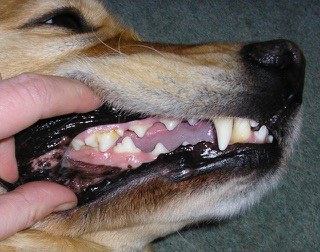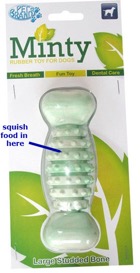6 Top Tips on How to keep your dogs teeth clean

But, as the bacteria builds up, heart diseases and other health problems may develop. It only makes sense therefore that we should all take the time to ensure that our dogs and puppies get used to having their teeth cleaned. We'll extend their lives and keep them healthier and happier too. So plan to start early with teeth cleaning.
Please don't just persevere with difficulties or give up. If you have any trouble with cleaning your dog's or puppy's teeth please do ask a behaviourist or trainer to help you build a clean teeth training programme. Your vet may also be able to help you with this of course.
Here's a quick summary of how to keep your dog's teeth clean:
- Start early. Get your puppy used teeth brushing (after you've taught them to stop biting your fingers).
- Use a dog toothbrush and dog toothpaste.
- Teaching your dog to love the right types of chews may help.
- Fixing teeth problems is expensive and is not generally covered in pet insurance.
So, to ensure your keep your dogs teeth as healthy as possible, please read these 6 top tips.
Tip 1: Get your puppy used to calm mouth handling and teeth checking
So, hey this is a bit mad really. On the one hand we're all on about - stopping a puppy nipping (putting their nippy teeth on your hands) and on the other hand we're saying - hey, let's get our hands inside our puppy's mouth and all over their teeth!! One rule for some and a different rule for others !! Hardly seems fair right?
Well, if you do have a mouthy, nippy, bitey puppy, then step one is really to teach them to not bite your hands (and other parts of you!). Read about how to stop a puppy nipping you here.
Once that's sorted, then we can move onto gently encouraging our puppies to be calm when we place our fingers and hands over their noses and under their chins. Practise this little and often and when your puppy generally calm. Gradually we can then start to rub a finger gently over their teeth. There are many different ways to do this. If you're having any trouble at all, please contact a behaviourist or trainer who will determine the quickest method to use. It's really worth covering this with your puppy trainer at the earliest possible time. Puppies learn by repetition. If they continuously repeat unwanted behaviours, then these mouthy behaviours will become habits. Teeth brushing then becomes very difficult with the dog simply choosing the chew the toothbrush - not quite what we want....
All puppy owners should teach their puppies to get used to you investigating their mouths and teeth. This is strange for a dog to begin with but they soon get used to the feeling.
Tips 2: Teaching your puppy to be calm with a dog finger tooth brush

(If you're having problems with puppy biting, please see here).
It's important of course that a bitey puppy doesn't simply learn to chew the tooth brush - and your finger!! So teaching calm head handling first will help. Whilst I'm not providing medical advice here of course, I'd be surprised if anyone would be overly concerned about the 1st few months of a puppy's life not including teeth cleaning. So take your time and work on biting / nipping and calm handling first.
Tip 3: Cleaning your dog's teeth with a tooth brush

Again, just start off with the brush and gradually brush for longer, then start to put on a tiny bit of toothpaste. There's no need to rinse with dog tooth paste.
Clicker training can also help an older dog or a puppy get used to having their teeth brushed. This starts with helping them to love the sight of a toothbrush and then builds to letting you brush their teeth. This video from Karen Pryor's clicker training academy is an excellent step by step guide on helping your dog to like getting their teeth brushed. (Please take that your peanut butter, if you're using that, is free from xylitol (a sweetener which is poisonous for dogs).
How to Brush Your Dog's Teeth - Look here at this popular veterinary video on how to clean dog's teeth
Tip 4 : Chewing helps to keep teeth clean

Veterinary Dentists only recommend rubber type dog chews to avoid the potential risk of bits of bone breaking off or even bits of plastic being broken off from harder chews. Now, of course, thousands of harder and natural chews are used without problems, but please speak with your vet for safe recommendations for your individual dog.kong dental stick
Chews with grooves and ridges where you can squish some tasty food have the added benefit of providing some mental stimulation and can keep your dog occupied during various behaviour training exercises too. Dental Kongs which have soft rubber ridges may well also help to clean the teeth.
Many pet owners consider that raw bones help to keep teeth clean. It's also considered that feeding more natural food may aid general teeth health. But, this is a controversial area so please do your research and decide on this for yourself. Your vet of course will be able to help with any questions.
TRUE OR FALSE? Dry dog food keeps my dogs teeth clean?
FALSE! Dry dog food may have some benefit over wet, but it has been proven that the kibble needs to be a particular shape and size before it has any noticeable effect.
Only specially created, specifically shaped dental food helps.
Tip 5: Cleaning the tartar off your dog's teeth without brushing
If your dog's teeth are already plaque stained or have tartar deposits then firstly, really you should speak with your vet about how bad the problem is. If your dog's teeth health is poor then the new clean teeth regime may need to start with veterinary cleaning.

Product such as a dental gel or Plaque Off can also sometimes help. (Plaque off shouldn't be used if your dog has thyroid problems. Always chat with your vet ofcourse before using any herbal or teeth cleaning product to ensure that they consider it safe for your individual dog).
PLAQUEOFF is a natural product that works to remove plaque on the surface of the teeth.
The active ingredient in PlaqueOff™ is a natural vegetable substance derived from specially selected seaweed. When this natural substance dissolves, the ingredients are absorbed into the bloodstream. The effect is to alter the composition of the saliva, which gains the ability to dissolve tartar, allowing the tartar to crumble away.
It also prevents new layers of plaque and tartar from gaining a foothold. The composition of the saliva can help to get rid of the bacteria that encourage the formation of plaque and tartar.
Plaque off is simply added to your dogs meal and the natural seaweed improves the state of your dogs saliva thus helping to reduce plaque.

Tip 6: And some final notes on cleaning dogs teeth
Keeping a dog's teeth clean isn't just about sweet smelling breath. Unclean teeth cause gum inflammation and disease and it is considered that periodontal disease may even be at least a partial cause of heart disease, and kidney and liver problems. So, getting into the habit of cleaning your dog's teeth will not only most likely extend their lives but also save your bank account from extensive and expensive veterinary dental treatment. Dog teeth cleaning and extraction is not generally covered under pet insurance policies.
Anecdotally, it seems that some individual dogs seem to have more naturally clean teeth than others. We could consider that this may be something to do with the differences in mouth chemistry. The problem is that we can't test this out when our dogs are young. We only find out about it when they are 3 years or more when trouble may already have set in. It's probably not too late to start, but please make sure that your regular vet check ups include a teeth check and of you haven't already done so - please start cleaning your dog's teeth now. Your dog may of course need a veterinary teeth cleaning procedure first. But don't suppose that one teeth clean will last for another six years!! Get cleaning now. (Again, if you have any problems, behaviourists, trainers, vets, vet nurses and groomers can all help you).
Read more about Dogs and periodontal disease and various treatments here.